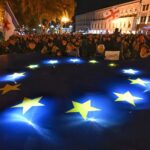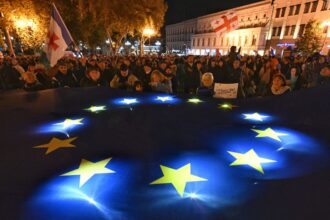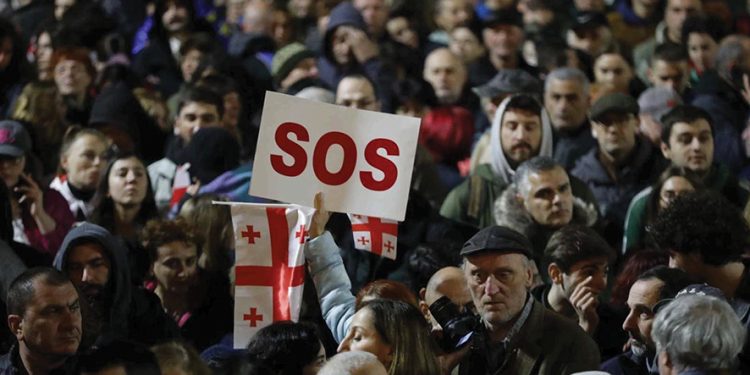The following statements could have made headlines around the globe: “A sophisticated, widespread, and well-orchestrated scheme,” says OSCE spokesperson; “Party organized intimidation and the feeling that Big Brother is watching,” describes OSCE official; “Vote buying and double voting before and during elections,” says Senior OSCE Observer, “Intimidation inside and outside polling stations,” OSCE Monitor Reports. But they didn’t. These quotes were taken from a press conference held on October 27 by the Organization for Security and Co-operation in Europe at the Radisson in Tbilisi. They were released less than 24 hours following the Georgian 2024 parliamentary election polls.
The OSCE Office for Democratic Institutions and Human Rights, widely regarded as the gold-standard for election observation in the OSCE, deploys teams of experts to monitor elections throughout member states. The OSCE released its preliminary report shortly after the dramatic press event. It highlighted issues such as voter intimidation, procedural inconsistencies, the dismissal of citizen complaints without due process, limited access to audits and unilateral decisions made by the election commission.
The OSCE is not authorized to assess the legitimacy of elections.
It is worth repeating that the OSCE has no authority to label an “election fraudulent”. This fact was reiterated in the OSCE’s press conference, and is clear in their Election Observation Handbook. Their sole role is to determine if the voting process adhered to international standards using a representative sampling methodology. Their assessment was damning.
On both methodological as well as empirical grounds, there is good reason to believe that the situation on the ground was significantly worse than OSCE observations.
Although the OSCE doesn’t publish the number observed, a quick calculation gives us an idea. Only 529 monitors were available, and they were placed in pairs at randomly selected sites. This meant that only 265 out of 3700 stations could be observed from opening to closing.
In an email exchange, a spokesperson for the OSCE noted that the mission had observed 2,000 polling station. This implies that observers traveled between stations. This would increase the number of sites visited but reduce the observation time to less that 7% of all time spent in open polling stations. In a context like Georgia, generalizing from limited data raises immediate concerns. These concerns are amplified by stark differences in regional voting patterns that are reflected in the results. The OSCE report highlighted irregularities at 24% of polling stations, highlighting the wide range of electoral environments. The more diverse an environment is, the harder it is to ensure representative samples.
Moreover, the abovementioned “sophisticated, widespread, and well-orchestrated scheme” (as described by an OSCE representative) raises the possibility that monitors themselves, two non-Georgian-speaking observers per station, conspicuously marked by OSCE vests, may themselves have influenced site-specific processes and behaviors.
Speculation? Not at all. These concerns are borne out by a number of other reports and data, which contrast with the OSCE’s limited positive opinion that “the voting process in polling stations was generally well administered.”
Take, for instance, the social media footage that shows numerous infractions, illegal activity, and even chaos within stations. These videos include: confrontations within polling stations, attempts and multiple voting, attempts to vote with someone else’s identification, voters accompanied to the voting booths, election workers struggling with mismatched I.D.s, individuals being removed for calling out violations, verbal and physical encounters, voting secrecy violation, and last but not least, notorious electoral tracking lists. The reports describe these in detail, and you can find many more videos under the hashtag #mevnaxegaqalbeba (I saw fraud).
In fact, the OSCE findings are so important to the international perception of the election that we should be surprised that despite a “well orchestrated scheme,” so many irregularities were slipped in plain sight of international monitors.
According to a report commissioned by Dr. Hans Gutbrod from Ilia State University we shouldn’t expect to find “a single smoking gun”, but “a dozen daggers”, to account for the’multi-pronged attack on election integrity’ in last week’s parliamentary elections. This is a typical example of modern electoral manipulation. His comprehensive analysis consolidates quantitative and qualitative evidence to capture a “multi-pronged approach” to suppress the oppostion and manipulate the result of the election.
The discrepancy in the results of the polls conducted by HarrisX and Edison Research, an authoritative US-based firm that specializes in election polling, was deemed “unacceptable” by the firm.
Transparency International published a report detailing pre-election violations that were also mentioned in the OSCE’s report. Transparency International published a report on October 21 detailing a systematic approach to manipulating the upcoming election process. A report on October 24 described Georgian Dream’s financial dominance. The party outspent all other parties combined and received donations from individuals with ties to public contracts. This raised concerns about systemic corruption.
The results of the local monitoring NGO ISFED using parallel vote tabulation align with CEC’s results, suggesting that any manipulation would have to occur before votes were cast. ISFED’s report also documents widespread voter harassment, bribery and intimidation. It also details data misuse and multiple voting.
No EU leader, except Viktor Orban has acknowledged the Georgian Dream victory. Western political leaders have expressed a mixture of concern and called for further investigation. This tepidity would be unacceptable if this situation had occurred in a country nearer to home.
Some Western commentators are quick to apply a cookie-cutter analysis of geopolitical issues from afar. Anatol Lieven is the Director of the Eurasia Program for the Quincy Institute for Responsible Statecraft. He implies a Western conspiracist conspiracy by framing the backlash as a pre-planned orchestrated effort to topple a government. Lieven demands “proof” of “large-scale rigging”, substantial enough to “reverse official results”. This is an inversion of all reasonable standards.
Lieven’s logic is similar to catching a student repeatedly cheating throughout an exam, but declaring the test valid, assuming that the remaining answers were answered honestly and in good conscience. According to Lievan’s logic, election fraud is a normal occurrence in Georgia. It is something that can be expected and is largely dismissed. It seems that we can only object after a thorough quantification. This level of proof would be virtually impossible to achieve, especially since the evidence would have to come from a court system heavily controlled by the ruling party (see also Georgia’s Clan of Judges).
Lieven’s assessment is that a large segment of Georgians are empty vassals, unable to do anything but express the thoughts of a meddling West. This opinion is both patronizing, and reductive. It also reveals a profound ignorance about the legacy of Georgian intellectual thinking, whose liberal ideas and European aspirations can be found in household names such as Dimitri Kipiani. Niko Nikoladze. Akaki Tsereteli. Ilia Chavchavadze. Iakob. Gogebashvili. Noe. Jordania. Otar. Chiladze. Akaki Bakradze. Merab.
In the midst a widespread campaign to undermine Georgia’s electoral process, the reality is that Georgian Institutions are suffering long-lasting damage. The process has lost its foundation due to the decimation of the public’s trust in the election. This betrayal by the Georgian people could plunge Georgia into a volatile political and social crisis.
Georgia is not only an EU candidate, but integration with the EU has been enshrined into its constitution. Every major political party declares this to be their ultimate goal. Europe has the right, and even an ethical obligation, to insist on a re-run of elections and that its aspirant member uphold democratic standards.
The editorial should end with a sense of direction. Yet I am at a loss. The future is unclear. I am reminded by the words of Otar Chladze, “Our duty is to leave darkness and to overcome darkness.” The full extent of damage is still unknown. Any resolution must ultimately come from Georgia itself and will require Europe’s good faith engagement. Our responsibility is to document the events accurately and thoroughly in the hope of a better outcome.
Blog by Ryan Sherman
Read More @ georgiatoday.ge













